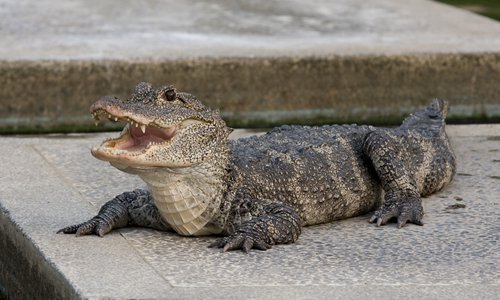
A Chinese alligator at the national nature reserve in East China's Anhui Province (Photo: IC)
More than 600 hectares of a nature reserve for Chinese alligators were found to have been exploited illegally as a development zone in a county in East China's Anhui Province. China currently has only some 100 Chinese alligators in the wild, far fewer than pandas.
A statement released on May 11 by the Chinese Ministry of Environment and Ecology (MEE) said that the local government had ignored a request from the higher authorities to rectify the problem.
The local forestry department has vowed to resolve the issue.
The Chinese environmental watchdog uncovered the scandal during a national environmental inspection in late 2018. The inspection found several similar cases of national reserves being damaged.
Projects halted
The Anhui Forestry Bureau said that the rectification of problems in the alligator nature reserve has been stepped up to ensure the operation of the reserve, anhuinews.com reported on May 13.
Approval procedures for construction projects in the reserve have been halted, said the bureau, while 5,000 more Photinia frasery trees have also been planted. "The bureau has found 345 illegal or unregulated issues in the alligator reserve and has rectified 289 of them," it said.
Residents in the reserve will also move out, said the bureau.
However, it did not mention how the existing development zone that occupies the alligator reserve will be dealt with.
The development zone of Jingxian county, Anhui, occupies around 602 hectares of Chinese alligator nature reserve land, according to a statement the MEE sent to the Global Times earlier.
The Anhui Provincial Forestry Bureau is directly responsible for the Chinese alligator nature reserve, but had been covering up the situation, and the damage done to the reserve will take a long time to resolve, the statement said.
An inspection of the Chinese alligator nature reserve in Anhui Province was carried out as part of the third round of central environmental inspections.
Apart from the Anhui alligator reserve case, the national environment inspection group also found that some land in the Yellow River wetland nature reserve in Northwest China's Shaanxi Province, an initial habitat of migratory birds, was being illegally occupied and exploited for farming and collecting sands, the MEE told the Global Times in another statement on May 13.
Under threat
China listed the Chinese alligator, also known as the Yangtze alligator, as a first-class protected animal in 1972. The species is endemic to eastern China and is listed as critically endangered by the International Union for Conservation of Nature (IUCN) with a population of only about 150 in the wild, according to the Xinhua News Agency in 2018.
Living along the middle and lower reaches of the Yangtze River, they have come under threat from human activity and shrinking habitats.
The national nature reserve of Chinese alligators was approved by the State Council in July 1986 to protect the Chinese alligator, said the MEE statement.
During a routine inspection in March 2010, the nature reserve's administration bureau found that the development zone of Jingxian occupied the land in the nature reserve.
The bureau reported its findings to the then Anhui Provincial Forestry Bureau.
In September 2011, the provincial bureau and Jingxian government came to an agreement without reporting the issue to either the higher provincial government or any other related department. A month later, the Forestry Bureau completed a demarcation for the reserve, determining that the section that was illegally occupied by the development zone was not a part of the reserve.
In May 2015, the then State Forestry Administration and nine other national departments released a document requesting those who had arbitrarily adjusted nature reserve borders to rectify and restore the original range.
However, the Anhui forestry bureau ignored the document. A total of 21 new projects were launched the same month in the alligator reserve.
In 2017 and 2018, even though central environmental inspections found illegal construction taking place on the reserve, the local government turned a blind eye to the issue and tried to cover it up, according to the statement.
The Anhui Yangtze Alligator Reserve is the only artificial breeding base for Yangtze alligators in the world. It had 13,000 captive alligators by the end of 2017, according to Xinhua.
Xinhua reported in 2017 that Anhui was considering a ban on entering the core areas of a Yangtze alligator reserve in order to protect the rare species. According to a draft regulation issued by Anhui's Forestry Bureau, anyone who needs to enter the core areas of the reserve to conduct scientific research must submit written applications and a work plan to the reserve's administrators, and gain approval from provincial forestry authorities.


